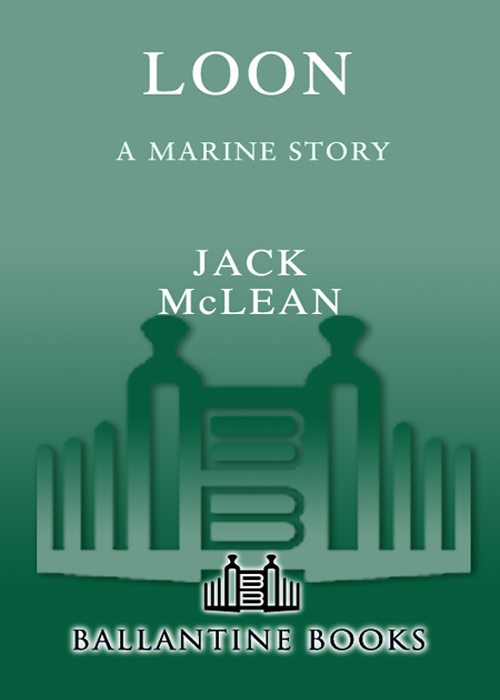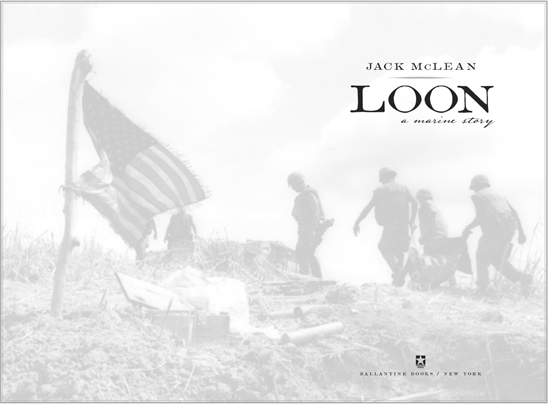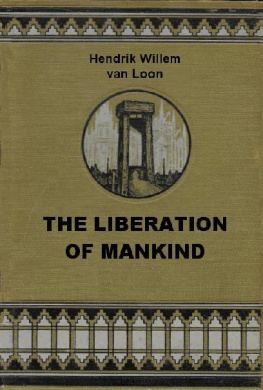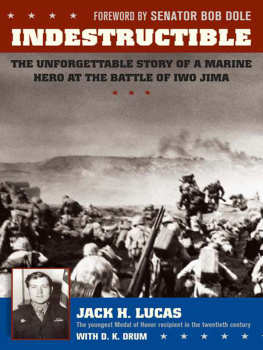Jack McLean - Loon: A Marine Story
Here you can read online Jack McLean - Loon: A Marine Story full text of the book (entire story) in english for free. Download pdf and epub, get meaning, cover and reviews about this ebook. year: 2009, publisher: Presidio Press, genre: Non-fiction. Description of the work, (preface) as well as reviews are available. Best literature library LitArk.com created for fans of good reading and offers a wide selection of genres:
Romance novel
Science fiction
Adventure
Detective
Science
History
Home and family
Prose
Art
Politics
Computer
Non-fiction
Religion
Business
Children
Humor
Choose a favorite category and find really read worthwhile books. Enjoy immersion in the world of imagination, feel the emotions of the characters or learn something new for yourself, make an fascinating discovery.

- Book:Loon: A Marine Story
- Author:
- Publisher:Presidio Press
- Genre:
- Year:2009
- Rating:3 / 5
- Favourites:Add to favourites
- Your mark:
- 60
- 1
- 2
- 3
- 4
- 5
Loon: A Marine Story: summary, description and annotation
We offer to read an annotation, description, summary or preface (depends on what the author of the book "Loon: A Marine Story" wrote himself). If you haven't found the necessary information about the book — write in the comments, we will try to find it.
Loon: A Marine Story — read online for free the complete book (whole text) full work
Below is the text of the book, divided by pages. System saving the place of the last page read, allows you to conveniently read the book "Loon: A Marine Story" online for free, without having to search again every time where you left off. Put a bookmark, and you can go to the page where you finished reading at any time.
Font size:
Interval:
Bookmark:


For my mother,
Martha Lamb McLean
Valerie Solanis took the elevator
Got off at the 4th floor
She pointed the gun at Andy saying
You cannot control me anymore
I believe theres got to be some retribution
I believe an eye for an eye is elemental
I believe that somethings wrong if shes alive right now
I Believe by Lou Reed and John Cale
ON THE AFTERNOON OF JUNE 3, 1968, IN NEW YORK City, Valerie Solanas, a rejected actress and a cult hero to a small segment of postmodern quasi-feminists, shot popular artist Andy Warhol three times in the chest at the Factory, his New York studio at 231 East Forty-seventh Street. She worked there occasionally. Solanas was the founder and sole member of a group named SCUM (Society for Cutting Up Men). When she was arrested the following day, she said, He had too much control over my life. She was later found to be insane and was confined to a mental institution for six years. Warhol initially was pronounced dead, but, after a desperate heart massage, he survived.
An hour later, sixty-five blocks uptown, at the magnificent Cathedral Church of Saint John the Divine on Amsterdam Avenue, history professor Richard Hofstadter was giving the Columbia University commencement address to what remained of a ragged collection of several thousand angry seniors. Most had walked out to protest Americas growing involvement in the war in Vietnam. Fittingly, Hofstadters subject was violence, more specifically the effect that the rapidly escalating war in Vietnam was having on the fabric of American society:
This misconceived venture in Vietnam has inflamed our students, undermined their belief in our political process, and convinced them that violence is the order of the day. I share their horror at this war. The deep alienation it has inflicted on young Americans is one of the staggering costs of the Vietnam undertaking. While this war has toppled a president, its full effects on our national life have yet to be reckoned.
The following day, June 4, 1968, a dozen United States Marine Corps CH-46 helicopters, two minutes apart, lifted slowly off the ground from their base at Quang Tri, Vietnam, and accelerated at an extreme angle to the west. Their destination was Camp Carroll. The mission was to pick up the one hundred eighty boys of Charlie Company and transport them, fifteen air-minutes, to the last piece of earth that many would ever see. On a map, it was called Hill 672, part of a rugged series of foothills southwest of Khe Sanh that protected the borders of both North Vietnam and Laos. For those of us who survived the coming three days of horror, it would become forever known as LZ Loon, or simply Loon.
On the following evening, June 5, 1968, Bobby Kennedy was shot at the Ambassador Hotel in Los Angeles by Sirhan Sirhan, a twenty-four-year-old Jordanian national. Kennedy, a native of my hometown of Brookline, Massachusetts, had enrolled at Harvard University only to drop out after several years to serve his country in the navy during World War II. To some, he was the best hope for a country that seemed to be in a spiraling decline. To many, his assassination was the last, unbelievably violent, straw. Among the stunned individuals that day were a growing number of the then 537,482 American boys serving in Vietnam who were fighting the very war that America was abandoning. A master politician like his brother, Kennedy knew that his best chance to win in November hinged on his opposition to the war in Vietnam, and so oppose he did, with a fervor that left Minnesota senator Eugene McCarthy and other early political leaders of the antiwar movement far behind.
Robert F. Kennedy was forty-two years old. He died the following morning, on June 6, 1968.
Those of us in Charlie Company who survived LZ Loon would not hear the news for another week.
Many of us died that day as well.
JUNE 6, 1968 .
It had already been a long day, and dawn had yet to break.
On his hands and knees, Bill Matthews scampered up over loose rocks and jumped into Bill Negrons hole. Out of breath, he gasped, Theyre diggin in. Theyre right in front of my hole, Skipper. I can hear em. Theyre all over the fuckin place.
Now, hang on, marine. Cool it. Catch your breath. Whos digging in and where? Negron was calm.
The gooks, for chrissake. The NVA, just like they did at Con Thien before they came through the wire, and, in case you havent noticed, we aint got no fuckin wire sir. Matthews caught his slight sarcasm and tried to temper it.
Negron grabbed his radio handset and called over to the 3rd Platoon. Charlie Three, this is Charlie Six Actual, do you read me? Over.
Six, this is Three. Go.
Three, this is Six Actual. Negron was gripping the handset ever more tightly so as not to miss a word. Is everything cool down there?
Thats a negative, Six. I think the visiting team has arrived and is getting ready for the kickoff. Over.
Charlie One, Charlie Two, and Charlie Three were the radio call signs of the platoons that comprised C Company, 1st Battalion, 4th Regiment, 3rd Marine Division. Charlie Six was the company commander, in this case, Captain William A. Negron. The Actual meant Negron himself as opposed to a designee, such as his radio operator.
A brief radio silence was broken by a call from the 1st Platoon. Charlie Six, this is Charlie One. Weve got company about five-zero meters out. Over.
One, this is Six Actual. Roger that. Give me an azimuth. Over.
Negron was looking for the exact coordinates of the reported activity so he could direct 60 mm mortar fire to the area.
Six, this is One. Wait out Six, this is Oneone-five mils magnetic. Over.
Incoming! came the call from the near side of the perimeter.
The ensuing explosion was followed by yet another call. Grasshopper Charlie Six, this is Grasshopper Six Actual. Things sound kinda rough up there for you. Give me a sit rep. Over. Grasshopper Six Actual was the call sign for our battalion commander, Lieutenant Colonel James H. MacLean (no relation to me).
Grasshopper Six, this is Charlie Six Actual. We are in the V ring. Surrounded by unhappy gooks. Send water, ammo, air, and arty. Now. Over.
Charlie Six, this is Grasshopper Six. I read you loud and clear. Whats your body count? Over.
Grasshopper Six, be advised that Ive lost an entire offensive football team and one baseball team. Im too busy killing em to count em. Ill be back when its quieter. Over.
Roger that, Charlie Six. Groceries and goodies are on the way. Over and out.
The brief radio silence was followed by an urgent whisper on another radio that was barely audible.
Charlie Six, this is Charlie Three. Over.
It was the voice of 3rd Platoon radio operator Mitchell calling from LZ Loon across the ravine.
This is Six. Go, replied Terry Tillery. Tillery was Charlie Companys radio operator, and never far from Negrons side.
Six, theyre coming at you. We can see it from here. Theyre all over your fuckin perimeter and they are coming at you. Over.
Negron grabbed the handset from Tillery.
Three, this is Six Actual, do you read me? Over.
Roger that, Skipper. Mitchell was out of breath and scared.
Three, can you give me their grid coordinates. Give me some numbers so I can lay some lumber on them.
With that, two 122 mm rockets screamed over the perimeter, followed by a volley of incoming grenades, mortars, and small-arms fire. The ground attack had begun.
Font size:
Interval:
Bookmark:
Similar books «Loon: A Marine Story»
Look at similar books to Loon: A Marine Story. We have selected literature similar in name and meaning in the hope of providing readers with more options to find new, interesting, not yet read works.
Discussion, reviews of the book Loon: A Marine Story and just readers' own opinions. Leave your comments, write what you think about the work, its meaning or the main characters. Specify what exactly you liked and what you didn't like, and why you think so.









